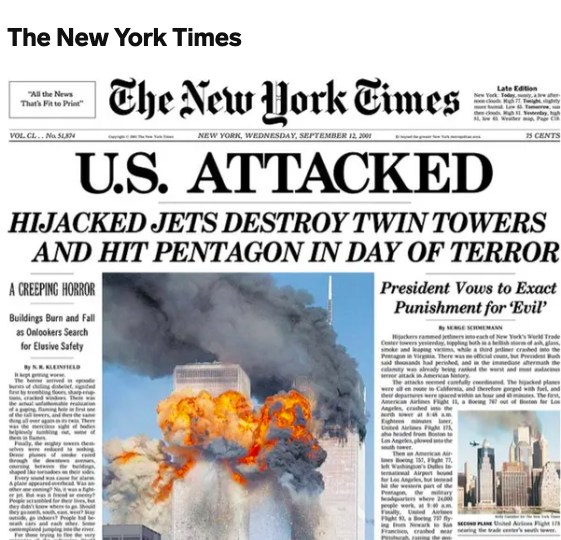Draft papers
“A work of art was once a work in progress.” - Adele Leon
Every project has a beginning, and if we’re really fortunate an end where we can share with it others, receive feedback, and contribute to a larger conversation in the world. In other words, research is most valuable when it is disseminated publicly for diverse audiences and interested stakeholders to read.
After combing through my archives and the many, many papers I have written over the course of my post-secondary education, I’ve chosen to self-publish select draft papers in the fields of mass media and communication studies.
Propaganda and the American Military Establishment: How Television Influences Attitudes, Behaviours and Perceptions (January 2010)
Source: Business Insider.com
The purpose of this paper is to examine propaganda, in particular wartime propaganda, in a post-9/11 context in order to understand the complex role that television plays as a tool of social control and mass persuasion. In doing so, this paper begins with an in-depth study of propaganda which explores the target audience and scope of propagandistic campaigns, the functions and objectives of propaganda, and, finally, the techniques and features employed in such campaigns. In order to distinguish between propaganda and other forms of promotional discourse, a discussion on the ethics of propaganda is conducted.
Finally, a case study focusing on the television series 24 is conducted to illustrate how patriotic and idealistic images can be used to mobilize support for the American military establishment and its strategic operations, including the acceptance of morally questionable conduct. This case study demonstrates the influential role that television can play in the context of wartime operations by encouraging support for the military and law enforcement agencies.
A Concept Paper on Propaganda (December 2009)
Photo by Possessed Photography on Unsplash
Contemporary propagandists often referred to as doctors of spin, are highly criticized for misleading their audiences in order to achieve a specific and desired outcome on behalf of their client. Propagandists and the very notion of propaganda were not always viewed in such a contemptuous manner. In fact, propaganda – which dates back to 1622 when the Roman Catholic Church was attempting to broaden the reach of its religious doctrine – became associated with deception and immorality following the First World War. It is therefore not surprising that much of the contemporary literature on propaganda examines the concept in the context of military operations and training exercises or describes propaganda techniques using traditional war terminology.
The objective of this paper is to dissect the concept of propaganda – examining the mediums used for communication, its functions, and its constitutive features – in order to situate the concept of propaganda as a form of mass communication and therefore differentiate it from other forms of mass communication.
How might television negatively affect democracy, politics, and government policy in the aftermath of 9/11 in the United States of America? (July 2007)
On September 11, 2001, two hijacked planes crashed into the North and South towers of the World Trade Center in New York City. A third plane crashed into the Pentagon in Washington, D.C., and a fourth crash-landed in a field in Pennsylvania. The World Trade Center towers, affectionately known as the Twin Towers, collapsed mere hours after impact. Two years after this tragic event occurred, CNN’s Phil Hirschkorn (2003) noted that the revised death toll of September 11 totaled 2,752 individuals, not including the 10 hijackers who crashed the airplanes.
The purpose of this essay is to determine how television might negatively affect democracy, politics, and government policy in the United States of America following the terror attacks of 9/11. In order to do so, this study begins by briefly examining the development of television technology and the origins of political broadcasting in the United States.
This is followed by a discussion of theories on the negative effects of television news media on interpersonal trust, political trust, and policy support. After examining the effects of varying media forms, this essay shifts its focus to a post-9/11 evaluation of news media in the United States in order to examine the degree of influence that the media may have had on government policies, political attitudes, and public opinion. The essay concludes by discussing potential future impacts of information communication technologies on democracy, politics, and government.


